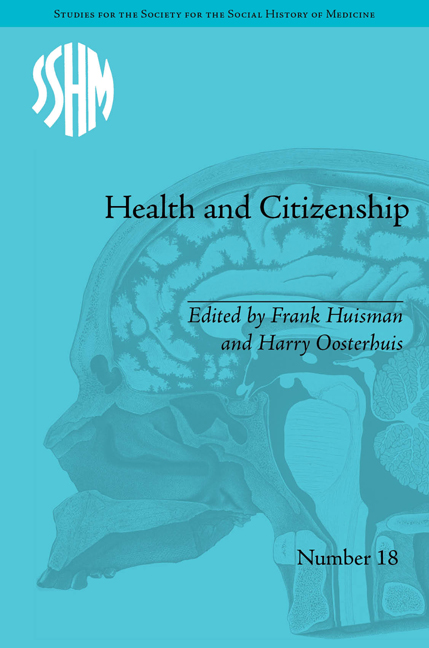Book contents
- Frontmatter
- CONTENTS
- Acknowledgements
- List of Contributors
- The Politics of Health and Citizenship: Historical and Contemporary Perspectives
- Part I Liberal Citizenship and Public Health
- 1 Before l'État-Providence: Health and Liberal Citizenship in Revolutionary and Post-Revolutionary France
- 2 An Oyster Odyssey: Science, State and Commerce in England, 1895–1905
- 3 Monopoly or Freedom of Healing? The Role of Medicine in a Modernizing Society
- 4 Ambivalences of Liberal Health Policy: Lebensreform and Self-Help Medicine in Belgium, 1890–1914
- Part II Social Citizenship: Health in the Welfare State
- Part III Neo-Republican Citizenship: Health in the Risk Society
- Notes
- Index
1 - Before l'État-Providence: Health and Liberal Citizenship in Revolutionary and Post-Revolutionary France
from Part I - Liberal Citizenship and Public Health
- Frontmatter
- CONTENTS
- Acknowledgements
- List of Contributors
- The Politics of Health and Citizenship: Historical and Contemporary Perspectives
- Part I Liberal Citizenship and Public Health
- 1 Before l'État-Providence: Health and Liberal Citizenship in Revolutionary and Post-Revolutionary France
- 2 An Oyster Odyssey: Science, State and Commerce in England, 1895–1905
- 3 Monopoly or Freedom of Healing? The Role of Medicine in a Modernizing Society
- 4 Ambivalences of Liberal Health Policy: Lebensreform and Self-Help Medicine in Belgium, 1890–1914
- Part II Social Citizenship: Health in the Welfare State
- Part III Neo-Republican Citizenship: Health in the Risk Society
- Notes
- Index
Summary
In France, all citizens and, indeed, all regular residents are now guaranteed access to health care through the law on la Couverture Maladie Universelle, or CMU, passed in 1999 and implemented in 2000. The CMU, however, is not simply an act enforcing a fundamental right of the sort enunciated in 1948 in the Universal Declaration of Human Rights. The declaration proclaimed that
everyone has the right to a standard of living adequate for the health and well-being of himself and of his family, including food, clothing, housing and medical care and necessary social services and the right to security in the event of unemployment, sickness, disability, widowhood, old age or other lack of livelihood in circumstances beyond his control.
The language of the French text is less robust:
A couverture maladie universelle is created for residents of metropolitan France and the overseas départements which guarantees to everyone health care coverage through a medical insurance policy [une prise en charge des soins par un régime d'assurance maladie] and, to those persons with the lowest incomes, the right to supplementary insurance protection and exemption from the requirement to pay charges up front [and then apply for reimbursement].
Although la prise en charge des soins might suggest that the state assumes broad responsibility for health care, the expression here has the narrower technical sense of coverage by an insurance policy.
- Type
- Chapter
- Information
- Health and CitizenshipPolitical Cultures of Health in Modern Europe, pp. 45 - 66Publisher: Pickering & ChattoFirst published in: 2014



